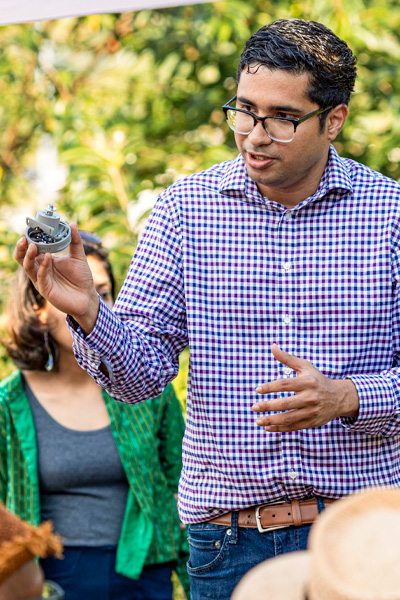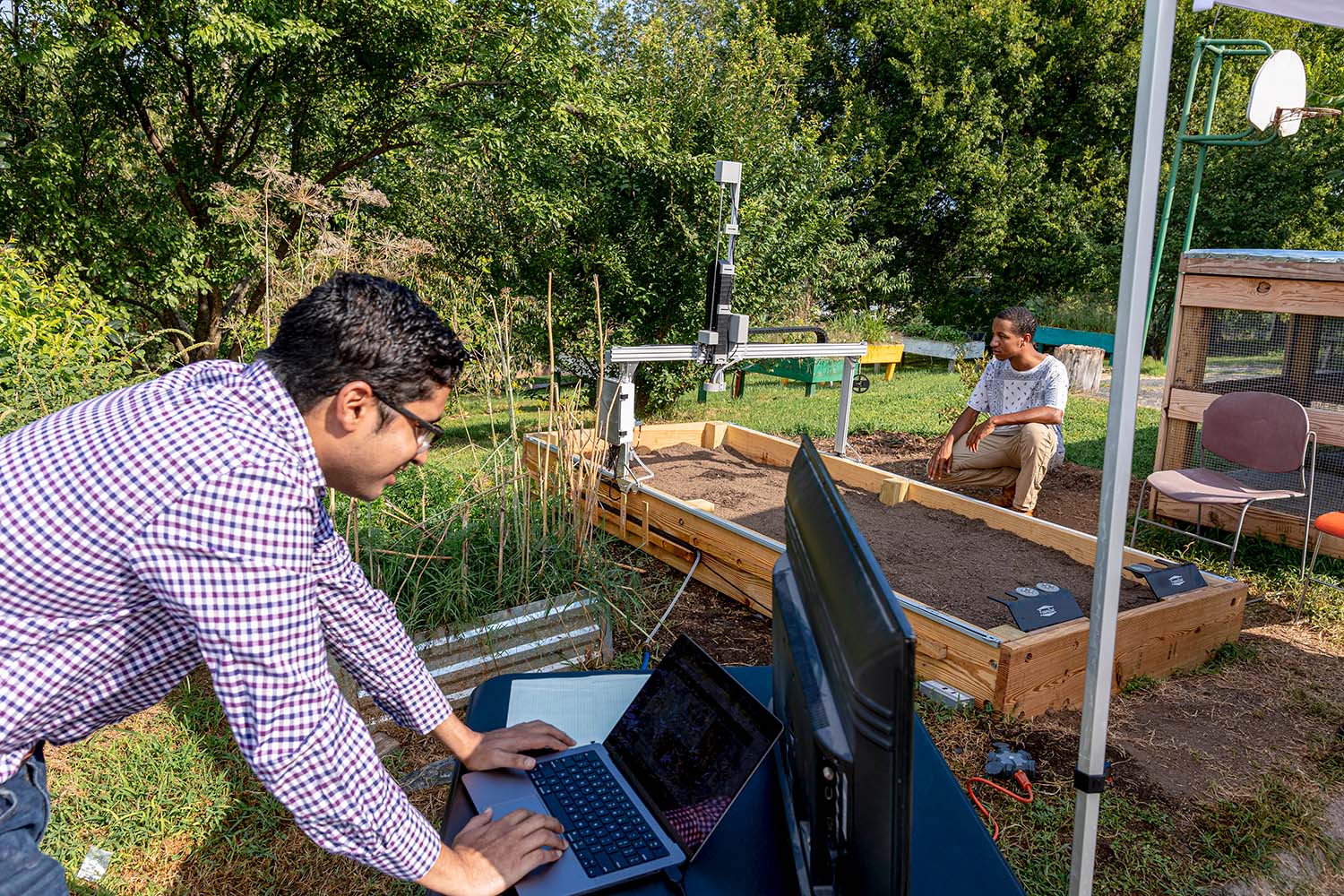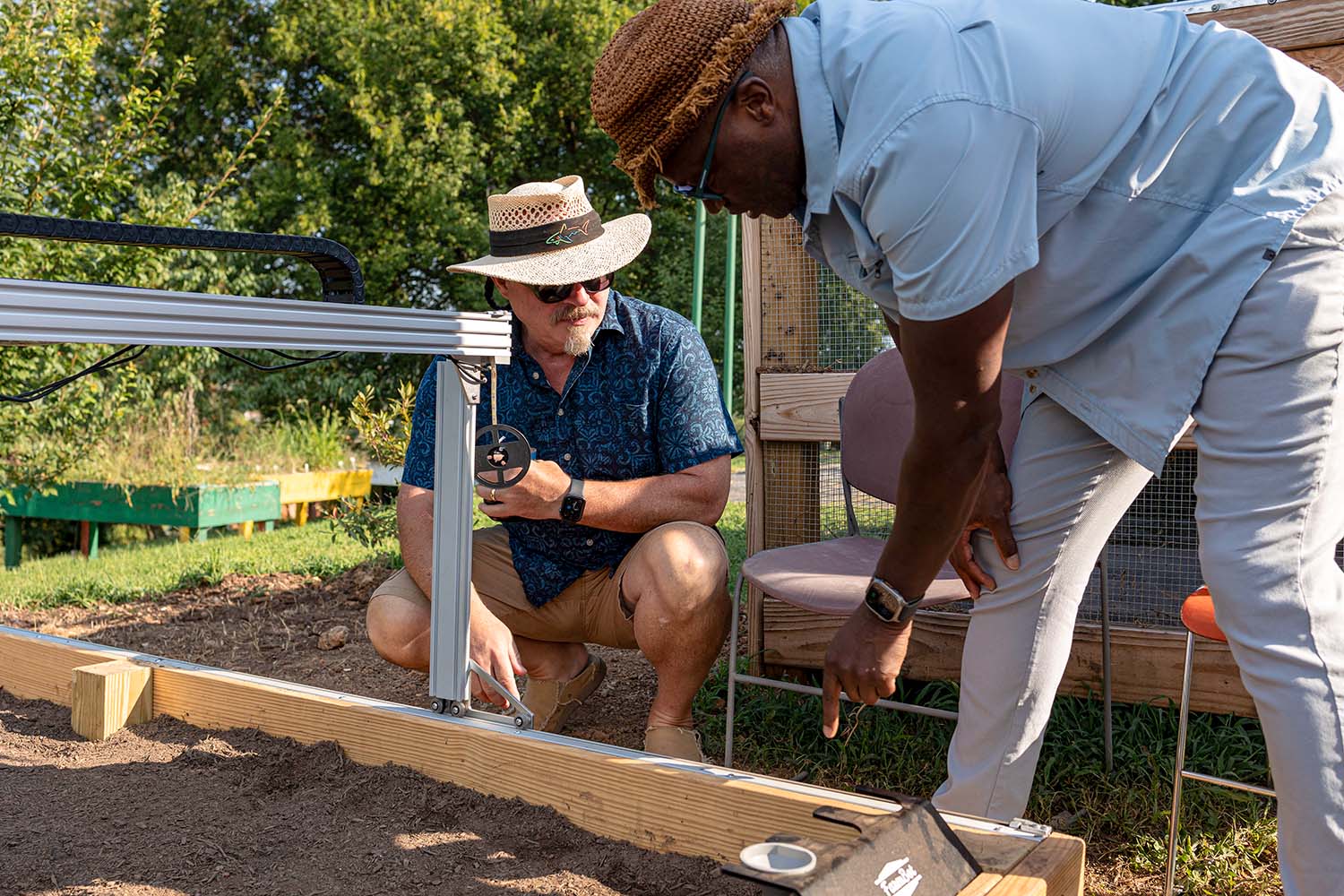UT Professors Design Robotics Education Program through Food Security Lens
A fruitful collaboration among professors at the University of Tennessee, Knoxville and a local nonprofit is helping tackle food inequity while teaching valuable engineering skills to high school students.

Sai Swaminathan, an assistant professor in the Min H. Kao Department of Electrical Engineering and Computer Science, researches how interactions with technology and artificial intelligence (AI) can improve people’s lives. Designing and studying technology within the context of having access to food is an important aspect of Swaminathan’s work.
His partner, Assistant Professor Sukanya Moudgalya of UT’s College of Education, Health, and Human Sciences, shares his passion, researching how technology education can contribute to addressing these issues.
Earlier this year, Swaminathan and Moudgalya teamed with UT Institute of Agriculture Assistant Professor Hao Gan, who specializes in applying sensors and robotic systems to agriculture, and began looking for local organizations tackling food inequality that could provide an avenue for computer science education.
They found the perfect partner in Socially Equal Energy Efficient Development (SEEED), a professional development organization in East Knoxville. SEEED offers career readiness programs where high school students can earn money while learning skills like financial literacy.
It also offers fresh produce in the middle of a two-mile-radius food desert.
Swaminathan, Moudgalya, and Gan began meeting with Stan Johnson, SEEED’s current chief executive officer, to brainstorm ways that computer science education and new technologies could be used to expand SEEED’s existing programs.
The professors proposed several technologies before one caught Johnson’s interest: FarmBot, an open-source robotic arm attachment for raised growing beds. SEEED hosted a launch celebration for the robot on Monday, August 12th.
“We’re hoping that getting this exposure to computer science and precision agriculture will inspire the career paths of young people,” Swaminathan said.

Feeding Future Minds
In SEEED’s community garden, called the Edible Forest, students are paid to develop skills in sustainable agriculture. The fresh fruits, vegetables, and herbs they grow are free to all members of the community.
This summer, Swaminathan, Moudgalya, and Gan secured funding for the FarmBot with a Challenge Grant from UT’s Department of Access and Engagement.
The first high school students to use FarmBot will be from Austin-East Magnet High School (A-E). Swaminathan’s team is currently writing a grant proposal to the National Science Foundation that would provide funding to develop comprehensive educational camps for A-E students to interact with the FarmBot and other farming sensors.
FarmBot’s precise movements and sensor integrations allow for precision agriculture, letting users plant seeds in custom layouts that take advantage of small-scale environmental factors favorable to each crop. It can also plant seeds, water crops, and even perform some weeding, freeing SEEED volunteers and students to focus on higher-maintenance crops than they can currently manage.
Even better, because FarmBot’s code and technical specifications are completely open-source, users can design new routines and 3D print custom tools based on their current needs. It would be a highly efficient way to tackle all of the team’s goals, improving food availability while giving local students hands-on experience with emerging technology—and the opportunity to impact the broader scientific community.
“The students can learn how to grow these crops from their community elders, while thinking critically about how to best work with the FarmBot,” Swaminathan said. “What are the kinds of data do you want? How do you want to collect them, analyze them, and synthesize them?”

Getting the Community Involved
Knoxville has 17 food deserts—urban areas where most residents lack reliable access to fresh food.
“Food apartheid is a big issue in east Knoxville,” said Swaminathan. “If you look at a map of Knoxville, or any urban area in the US, you will see that food deserts largely overlap communities of color.”
While attempts to improve access to food frequently incorporate computer technologies like AI, those systems are often implemented without input from the recipient communities, limiting their adoption and effectiveness. Swaminathan and Moudgalya want to fix that.
“We need to make this process more inclusive, so that the people who get impacted by these technologies are also developing them,” Swaminathan said. “If we want our research and anything we develop to actually have a positive impact, it has to be something that people in the community are genuinely excited about.”
While he was excited to help demonstrate FarmBot at the launch ceremony, Swaminathan emphasized that the robot is just a tool—and its installation is just the beginning.
“Yes, it’s technology,” he said, “but what’s exciting is that it’s technology applied in a manner that communities in Knoxville can benefit from. The human-centered aspect of this technology is what is most exciting to me.”
Contact
Izzie Gall (865-974-7203, egall4@utk.edu)